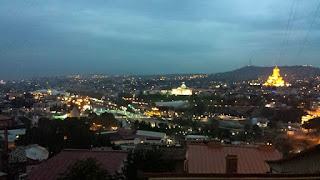This summer, I am living in Tbilisi as an intern for the Millennium Challenge Corporation, a development agency of the United States government. The last time I worked on this blog, Facebook was barely a thing, so the distance through my network that this would go was slim. Now, everyone out there will probably dig in and enjoy it.
I'm starting this summer's blog with a reflection on privacy and sharing in an open world for some context on everything to come. I still plan on writing with honesty and the deepest effort I can to immerse you in what I feel, see, and do. However, buy me a drink at some point and that's when I'll really dig deep into depth. :-)
I've been in Tbilisi for seven hours short of a week.
The city tempts one to use stereotypes as a shorthand to communicate how it feels. Granted - my frame of reference is narrowly limited to the United States, Buenos Aires, and film.
Tbilisi has a clash of tree lined avenues and winding streets that diminish into hillside collections of wooden homes with elaborate terraces. Sidewalks have a constant churn of people but the streets are a never ending flow of speeding cars. Crossing the street is foolhardy and comparable to being Frogger. Cars do not slow down and there are limited crosswalks on the main roads but a network of tunnels can be found scattered across the city.
Car culture in Tbilisi is a good window to start understanding Georgia's recent history. According to Georgian friends of mine, street lights (and reliable electricity in general) are fairly new. Before street lights, everyone had to be an aggressive driver, yet a driver who understood the street's rhythm, in a defensive manner. Now, there are many street lights - so many that at night, the city is arrayed below you in a beautiful constellation of orange pips populating the valley.
History and how far Georgia has come always seems to be at the front of any conversation about Georgian politics, economics, or history. With a deep history of independent identity, even under Soviet rule, there is a mantra of Georgian uniqueness of identity and heritage. Yet, befitting my narrow frame of reference, of course all nations do carve out their own unique role in history.
Yet...something rings true about what Georgia represents. Going hand in hand with Tbilisi's European nature is another sense - the long history of multiculturalism brought on by being a Christian enclave for thousands of years within the gateway to Asia.
What does this mean and what balance can be found within it now? And what is there to learn for an American with idealistic, just short of naive, ideas about the role of the US abroad?
Despite knowing only about two words in Georgian and acknowledging the Georgian script for all its complexity, after a week here, I don't feel as isolated as I did in Buenos Aires (despite having studied Spanish for years before moving there). Is it my own sense of adaptability that's changed? A greater tapping of the universal language that has happened? Is it the nature of Georgia? Or a bit of it all?
As before, understanding this barrier (or lack of it) is what this blog will be about at its heart. And here, its tapping the cosmopolitan nature of Tbilisi and what it means to the rest of the country and what I am here to do and learn.
There's more to come, probably imminently, but as far as introductions go, I think this went pretty well.
What do you think?

No comments:
Post a Comment